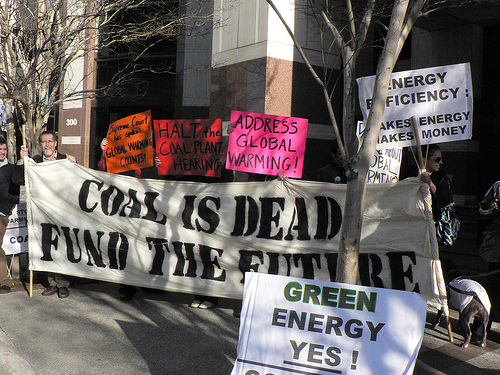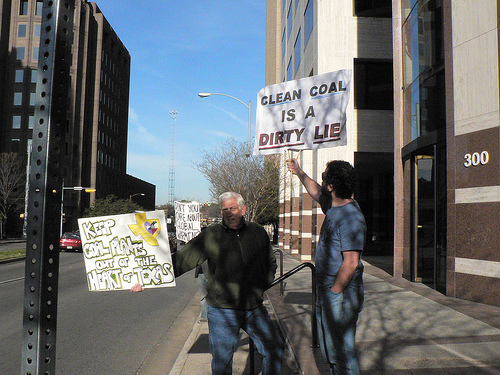Environmental Groups Applaud EPA Choice
New Regional Administrator could signal change in direction for polluted state
DALLAS – Environmental advocates across several states are applauding the Obama Administration’s choice of Dr. Al Armendariz to lead Region 6 of the Environmental Protection Agency, which includes Texas, Louisiana, New Mexico, Oklahoma and Arkansas. Armendariz, an engineering professor at Southern Methodist University, has worked with diverse constituencies ranging from corporations to citizens groups and has published dozens of studies on myriad environmental issues throughout his career. His appointment garnered high praise from the environmental community.
“Our region has typically provided a haven for some of the worst polluters in the country, and has paid a steep price,” said Tom “Smitty” Smith, Texas Director for Public Citizen. “I believe the appointment of Dr. Al Armendariz signifies a new direction for Region 6.”
In an effort to make sure EPA Administrator Lisa Jackson and the White House chose a strong environmental leader for Region 6, about twenty prominent advocates signed on to a list of principles that they hoped would guide the appointment. Dr. Armendariz was one of two candidates the groups endorsed for the position. Their list of qualities for an ideal administrator included a commitment to environmental justice and science-based policy, minimal ties to industries regulated by EPA and a strict adherence to the President’s Executive Order on Ethics, which was intended to prevent conflicts of interest between lobbyists and government agencies.
“Al Armendariz demonstrates the kind of vision, integrity and grassroots approach to enforcing environmental law this region needs if we’re truly going to clean up our act,” said Jeffrey Jacoby, Program Director at the Texas Campaign for the Environment (TCE). “He embodies the ‘Principles for Environmental Leadership and Real Change’ we believed should guide this appointment.”
Indeed, many within the environmental community see appointment of Armendariz as indicative of a new approach for the regional EPA.
“We are thrilled with Dr. Armendariz’s appointment,” said Luke Metzger, Director of Environment Texas. “After eight years of the Bush EPA, it’s a new day for Texas’ environment. Move over polluter lobbyists, science and human health are in charge now.”
In addition to environmentalists, some within the business community were also pleased with Obama’s choice. Former Austin City Councilmember Brigid Shea, now principal and co-founder of an environmental consulting firm, stated, “As a businessperson who’s concerned about the environment, it’s time this region got someone who understands that we can have both a healthy environment and a strong economy, that the two are not at odds.”
Dr. Armendariz will take over for Acting Region 6 Administrator Larry Starfield. During his tenure, he will face a number of pressing environmental challenges, including potentially overseeing the implementation of federal climate change legislation, bringing metropolitan areas in Texas into compliance with the Clean Air Act and working to clean up toxic “hot spots” along the Gulf Coast.
“Texas needs a tough air enforcement chief at EPA 6 Dallas like Dr. Armendariz who’s willing to tackle head on the state’s serious air quality challenges with large urban areas like Dallas and Houston failing to meet new ozone standards, and who is willing to require Texas to clean up its large dirty coal plants and refineries,” stated Dr. Neil Carman of the Sierra Club’s Lone Star Chapter.
Environmental justice activists from communities across the state are also hopeful that the appointment of Dr. Armendariz will benefit Texans living directly adjacent to polluting facilities
“The Executive Order 12898 on Environmental Justice is a document that looks good on paper, but in the real world EPA’s office of Environmental Justice has at times sided with industry over our communities; and pollution problems in poor communities have gotten worse, not better,” said Suzie Canales, Executive Director of Corpus Christi-based Citizens for Environmental Justice. “Now under Armendariz, we have real hope that environmental justice issues will be a serious priority to the agency.”
Many environmental justice groups endorsed Armendariz from the beginning of the Regional Administrator selection process, citing his commitment to science, his understanding of the issues and his dedication to enforcing the spirit of environmental laws such as the Clean Air and Clean Water Acts.
“Dr. Armendariz is exactly the kind of person you’d want to have this job, but seemingly never gets it,” said Jim Schermbeck, long-time Field Organizer with Downwinders at Risk. “Because of what’s at stake and the fact that Texas is the belly of the polluter beast, this may be one of the most important, far-reaching appointments the Obama Administration makes. Downwinders at Risk is proud to have been the group that first utilized Dr. Armendariz’s expertise for our cause of cleaning up the Midlothian cement kilns back in 2005. That work lead directly to his becoming the premier ‘citizen’s scientist’ in Texas on air pollution, and paved the way for his much larger influence on the state scene. Congratulations to both Dr. Armendariz and the EPA.”
As enthusiastic as environmentalists are about the appointment, they also promised to hold Dr. Armendariz accountable to the people affected by pollution issues in the five-state region. “As outstanding as Dr. Armendariz has been on paper and in interviews, we’ll be watching to make sure he walks the walk,” says Jacoby, who works in TCE’s Dallas office, “Remember, Al, my office is right down the street.”
# # # #
By promoting cleaner energy, cleaner government, cleaner cars, and cleaner air for all Texans, we hope to provide for a healthy place to live and prosper. We are Public Citizen Texas.
Read Full Post »

 Thanks to Luke Metzger at the
Thanks to Luke Metzger at the  Hey folks, tomorrow a whole host of solar bills are going into be heard in the Senate Business and Commerce Committee. Our friends over at Environment Texas have a petition up where you can
Hey folks, tomorrow a whole host of solar bills are going into be heard in the Senate Business and Commerce Committee. Our friends over at Environment Texas have a petition up where you can  Last Friday two administrative law judges refused to hear testimony on the impact of carbon dioxide emissions during the permitting process for the NRG Limestone coal-fired power plant. The contested case hearing for NRG’s air quality permit application will be going on all week long, but testimony on the proposed plant’s contribution to global warming will not be allowed. The judges decided that the TCEQ has adopted clear policies that they would not consider testimony on the issue, even though the Supreme Court ruled in 2007 (
Last Friday two administrative law judges refused to hear testimony on the impact of carbon dioxide emissions during the permitting process for the NRG Limestone coal-fired power plant. The contested case hearing for NRG’s air quality permit application will be going on all week long, but testimony on the proposed plant’s contribution to global warming will not be allowed. The judges decided that the TCEQ has adopted clear policies that they would not consider testimony on the issue, even though the Supreme Court ruled in 2007 ( In protest, local environmentalists gathered for an 8:30 a.m. protest Monday Feb 22 outside the State Office of Administrative Hearings. Groups supporting the protest included: Public Citizen, SEED Coalition, Environment Texas, Clean Water Action, Re- Energize Texas, and the Texas Climate Emergency Campaign.
In protest, local environmentalists gathered for an 8:30 a.m. protest Monday Feb 22 outside the State Office of Administrative Hearings. Groups supporting the protest included: Public Citizen, SEED Coalition, Environment Texas, Clean Water Action, Re- Energize Texas, and the Texas Climate Emergency Campaign. As expected, the Austin City Council made the decision to delay the vote on Austin Energy’s proposed solar plant until March 5th. Council Member Mike Martinez wanted to put it off longer, but since the bid for the plant will actually expire just seven days after this March meeting, the council agreed unanimously to have the final vote in three weeks time.
As expected, the Austin City Council made the decision to delay the vote on Austin Energy’s proposed solar plant until March 5th. Council Member Mike Martinez wanted to put it off longer, but since the bid for the plant will actually expire just seven days after this March meeting, the council agreed unanimously to have the final vote in three weeks time.

